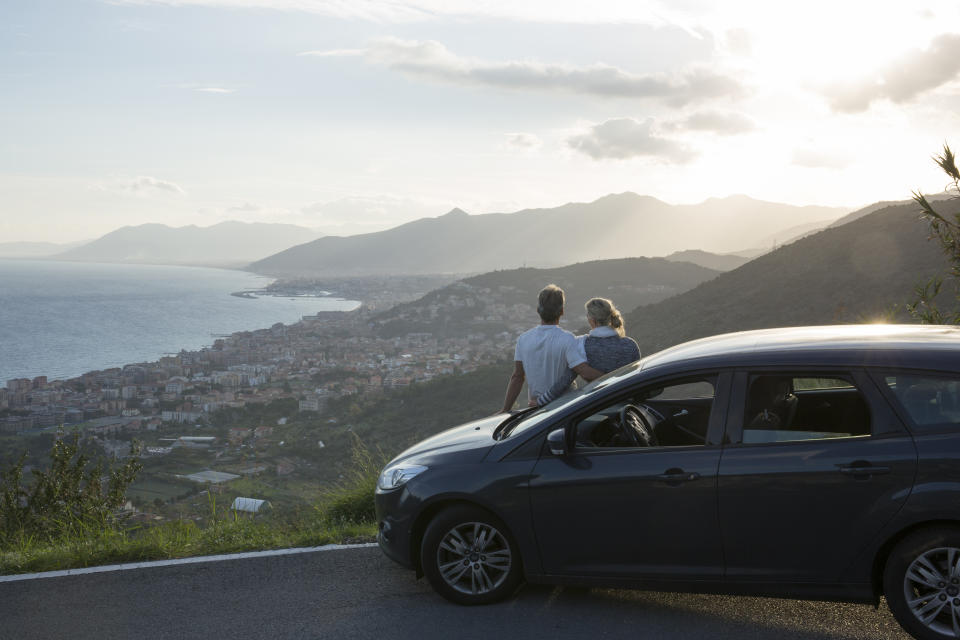Here's how engaged couples are celebrating postponed weddings: Money, Honestly podcast
Engaged couples whose weddings this year have been derailed are creating a new travel trend — dubbed a first moon — to combat their pandemic disappointment.
These are shorter, usually domestic and smaller-scale honeymoon that couples are taking on or around an original wedding date that’s been rain-checked by COVID-19. One-third of couples are planning to take a first moon, according to a recent survey by Zola and TravelZoo.
Cashay.com Editor Janna Herron sits down with reporter Stephanie Asymkos to discuss this new trend and how the pandemic is changing honeymoons in this latest episode of Money, Honestly podcast.
The podcast is based on reporting Stephanie did for Yahoo Money.

(Transcript below)
Janna: This is Money, Honestly. I'm Janna Herron. Today, Stephanie Asymkos, a reporter on my team at Yahoo Money and Cashay is joining us. We'll be talking about this new trend of first moons for engaged couples.
Stephanie, thank you for being here.
Stephanie: Great to talk to you, Janna.
Janna: And we have talked about weddings before during the pandemic, right?
Stephanie: Yes, we have.
Janna: So this is like right down your alley here. So tell me, what are engaged couples facing this year?
Stephanie: Just like a world of disappointment and sadness. And the couples that I have talked to, and starting from March when I was talking to couples who had April, May, June weddings, I've been in contact with them and one of them recently told me that she has changed her wedding date three times, and now, she's just indefinitely scrapped the reception altogether. It turned out that they were married in their apartment with a friend and it's just like, "We're done."
So that is just like a microcosm of the wedding industry in 2020. So, what's happening [crosstalk 00:01:32]
Janna: It's so sad.
Stephanie: It's so sad. It is. And they're making the best of it. And I guess this trend now that we're talking about is one way that people are making the best of it, and that is that's a first moon. And that is the term that's being coined for a... It's a pre-honeymoon, is one way for people to get their arms around it, but it's also a honeymoon on a much smaller scale. And it comes before your wedding and it is domestic, and is also significantly cheaper and shorter. And the key piece of this is that it comes on or around the original wedding date that a couple had that is no more.
Janna: Okay. So can you give me an example of what a first moon looks like? Or have you talked with anybody who went on a first moon?
Stephanie: I did. I talked to Hailey Murphy. She's actually an employee of Zola, which is the sort of wedding websites, suite of wedding planning tools that engage couples use. And she was actually supposed to get married August 15th of this year, so two months ago, and now her wedding is August of 2021.
But the idea that we really talked about is how just profoundly bummed she was going to feel on August 15th. This date has been 18 months in the works of planning. It has been monogrammed on things. It has been engraved on things. It was out there, it was official. And we really talked about how sad her and her fiance were going to be because there was really no way for them to celebrate with others because that would be a violation of social distancing, and there wouldn't be any type of celebration to the day.
So the idea, and it's not just her idea, but we know that many couples are doing this, is that they're taking a trip that's on or around that wedding day to make it special and to sort of celebrate what would have been a milestone in their sort of journey of their relationship.
So what Hailey and her fiance did was they were supposed to be on their honeymoon for two weeks in Mexico and that turned into six days in Nantucket, Massachusetts. And they drove up there and rented a house. And that sort of stays in line of what this broader trend is of people staying close to home and spending less money. And it's really been exciting for these couples who have really just had blow after blow of [crosstalk 00:04:58] has been.

Janna: Yeah. And you said, for example, a lot of weddings are 18 months in the making and people often choose dates for a reason. Like it's either an anniversary that their parents also have or their first date. So those dates often come with their own marking and it would be bad to make it a sad day.
Stephanie: I know. Yes, people, I mean, this is a terrible pun that I've used before, but people are really wedded to those wedding dates, Janna. They have a lot of significance of, like you said, like grandparents' anniversaries, parents' anniversaries, and then people who they get engaged and they want to do it in the same date or month or whatever. And that's totally personal to them. That's totally their prerogative. And that's fine if people, whatever they would like to do to choose their wedding date is all right by the rest of us, but they want to still do something on that day to not be so sad. And that's what the first moon is. So it's that getaway to just be away and not in the mundane day-to-day.
Janna: Right. And I was wondering, do you have any stats in general about how many people have had to postpone their weddings and things like that to give kind of a scope of how this is affecting couples? I know you've heard of some people who went ahead and they either did a really small ceremony or some people maybe did something that was not so good and did a large gathering, like the one in Maine, and caused all kinds of outbreaks, but how many people are actually postponing?
Stephanie: Right. So Zola's research says that 62% of couples have postponed their weddings.
Janna: Oh, wow.
Stephanie: Yeah. But then that other odd 40%, 38%, is that the couples who have gone on with their weddings, they have done sort of tremendous things to scale down and like uninvite people and move things to backyards or to living rooms or to Zoom and still find some way to host and go on with the show, so to speak.
Janna: Yeah. And if you do decide to go on with the show, how much are you spending extra to replan those, that wedding?
Stephanie: It is not insignificant. And weddings are already very expensive. We know this. So like 27% of people have spent between a $1,000 and $5,000 to replan.
Janna: Oh wow.
Stephanie: Yeah. And a lot of this is like, "Oh, that's highway robbery, that's so much money to replan," but we need to think about it, is that not every wedding venue is this big corporation. A lot of people use local businesses, vendors, self-employed-

Janna: Restaurants, yeah.
Stephanie: Yeah, restaurants, self-employed individuals, small cater companies. Those individuals, those folks have gone without income for months. No one is gathering, no one is celebrating anything. So we have to understand that it's not just the couple that's out this, but it's sort of the entire wedding industry that is really struggling.
Janna: And so you said, when you were describing these first moons, that they're usually domestic. How much would you say, they're not as grand as what the honeymoon like in Bali would be, but how much are people spending would you say?
Stephanie: So what I found out from my research with Zola is that... So the average honeymoon, so let's talk about anything pre-March, 2020, right? We know that the average is a European destination. It is eight days long and comes with a price tag of $5,000. So that is the benchmark. So we know that the first moon is usually four to six nights, and then the spend is really about a $1,000 to $3,000. So significantly cheaper and shorter as well. And then, Americans, we're not traveling to Europe right now. We're not really traveling anywhere because of travel bans and domestic state to state advisories. So by default, these are domestic destination first moons.
And people are hopping in cars. They are not traveling by plane, or I shouldn't say they're not, there's a very small percentage that are traveling by plane. No one really is cruising. And they're kind of going within a reasonable radius for a road trip. So if you live in the Midwest, you stay in the Midwest, and you kind of just stay in your region, so to speak.
Janna: I mean, I guess this on a small scale probably is helping some of those destinations, those domestic destinations.
Stephanie: Definitely. Especially for people who did summer first moons, if it was a resort community that wasn't seeing traffic or was at a cruise port that wasn't getting the cruises that were dropping people off, it's fantastic that people were going there. And even if you're not eating in restaurants, you're still spending money, and it was probably a boon for those smaller economies, for sure.
Janna: And what were they doing on their first moons? What kind of activities? You can't do some of the things that you would probably have done on a big honeymoon, so what are the things that they stuck with?
Stephanie: Yeah. People are, I mean, this is a broader trend of just social distancing altogether, but people are primarily going outdoors. They're going to beaches, lakes, mountain communities. They're hiking, they're kayaking, they're doing sort of these things that get away from other people. So I guess you could spin it as like, "Oh, that's romantic. It's just the two of them together."
And then we also know that people are renting homes just to avoid that daily contact with hotel staff. So renting a smaller property or apartment or what have you, and then going to sort of these outward destinations that you probably normally wouldn't travel to, but now, people are. And that's kind of how Hailey Murphy and her fiance got to Nantucket. They live in New York City. Nantucket, oh boy, probably like a five hour drive from New York, maybe?
Janna: Mm-hmm (affirmative). Sounds about right.
Stephanie: Yeah, that sounds about right. Maybe cutting some slack of an hour off in each direction, but yeah, that's where they went. And that's sort of the general gist of where people are headed.
Janna: And I mean, obviously the coronavirus is not going to be with us forever and we're hoping that 2021 will see more normal life. So what are the futures of honeymoons? I mean, I guess these first moons would go away when they're not necessary anymore, but what were people saying about honeymoons in the future?
Stephanie: Right. I mean, we really don't know where the longevity is for these first moons. And I think another piece of this is, as the country regains its confidence about travel, another piece of that is just spending and when people feel confident enough or they feel like their bank accounts reflect the amount of money that should be there to spend all this discretionary income on travel and something very indulgent and something very lavish.
So it'll be when spending returns, when travel returns. And then sort of like where people are going to go, Zola has already seen sort of the top honeymoon destinations already flip. And like I said before, the number one original destination for this year was Europe, and now, it's somewhere in the continental United States. That is now number one, whereas no place in the continental United States appeared even in the top five of original honeymoon plans.
Janna: Wow. Really?
Stephanie: Yeah. The whole game has changed of where people are going. So of the original honeymoon plans, it was Europe, the Caribbean, and then Hawaii, which obviously is in the United States, but not the continental United States. And now, it's the continental US, followed by Mexico, Alaska, Hawaii, and the Caribbean. So staying very close within North America, and that's where people are headed now.
And when I talked to Hailey, she said that people still have the dreams, like the flights of grandeur about these honeymoons. And she still says that people are dreaming of that Bali honeymoon or the Maldives or someplace that celebrities go. No one actually goes there, right? But people are still dreaming of that. So for some people, the dream has changed to a domestic honeymoon and that's fantastic, but some people still have that idea of the French Polynesia or wherever.
But one thing is that the idea of requiring flexible travel plans, that is something that might take a foothold and a permanent foothold in the wedding planning scope. And that's the idea of booking a transferrable honeymoon with floating dates and floating locations. So basically, you can book through a company like Travelzoo, which has partnered with Zola, and you basically put money down as a deposit, but you're not committed to a particular location or dates, with the understanding that plans change-
Stephanie: And no one knows what the next year is going to look like. And even if it's not a pandemic that can change your plans, plans can change for weddings for any reason.
Janna: True.
Stephanie: So that's really something that Hailey says as both a bride who had her wedding postponed, and then as someone who works in the wedding industry. That's something that's really going to be perhaps like a real sticking point in the future, of just this understanding of we need to plan for contingencies here.

Janna: Right. Especially if you're putting down so much money.
Stephanie: Exactly.
Janna: And like you said, it was like $5,000 is the average-
Stephanie: Right.
Janna: And you just don't want to be out $5,000.
Stephanie: Yeah, or having hotels and resorts sort of give a little bit more to couples of sort of more flexible, more negotiable cancellation policies, where maybe you lose 10% of a deposit or 25% of a deposit, or you have longer windows that you can cancel [crosstalk 00:18:45]
Janna: Sure. Yeah. I mean, the travel industry itself is in disarray and it will be interesting to see how they come back. Did Hailey ever say, did she say that next year, is she getting married on the same date or-
Stephanie: So she's actually getting married the following weekend. So she was supposed to be married August 15th and now she's getting married August 27th.
Janna: Did you ask her if she's going to celebrate the first moon anniversary?
Stephanie: Oh, I should have. No, she's actually saying that it's going to be a carbon copy wedding on the 27th. It's the same band. It's the same dress, the same menu. Everything is the same. So it's kind of this, I mean, it's one way to look at it, it's kind of this gift that none of these couples asked for, and that's the gift of time. And if they are working, it's another 12 months, another nine months, whatever, of time to earn more money to pay for these weddings in 2021 or 2022, whenever people do want to have their union and celebrate.
Janna: I like that. That's a good way to end it, with that silver lining. Because a lot of people do go into debt for their wedding and this might be a way for them to not have that debt at least after they get married.
Stephanie: Right.
Janna: So thank you so much, Stephanie, for joining us today on Money, Honestly, and thanks for everyone listening. Head over to Apple Podcasts and leave us a five star rating and review. We'll see you next week.
Stephanie is a reporter for Yahoo Money and Cashay, a new personal finance website. She can be reached at stephanie.asymkos@yahoofinance.com. Follow her on Twitter @SJAsymkos.
Read more information and tips in our Spending section






